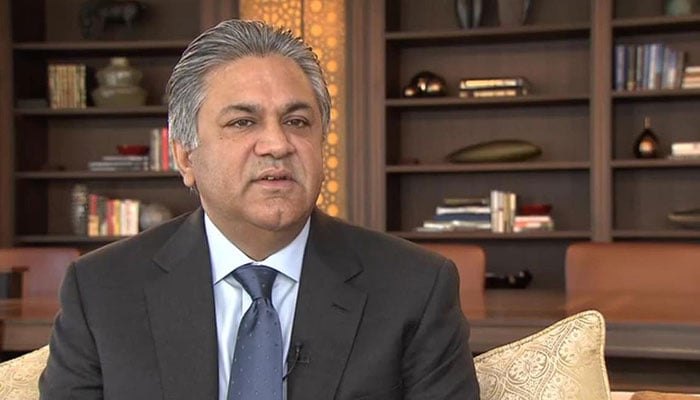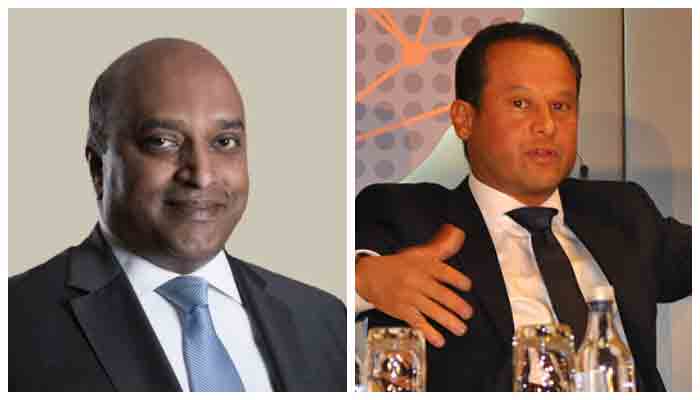Two Abraaj partners accepted criminal charges to help US get Arif Naqvi
LONDON: Abraaj chief executive officer (CEO) and group founder Arif Naqvi is still awaiting the outcome of his appeal against the decision by the Westminster magistrates’ court to allow his extradition to the US, but two of his senior managing partners Egyptian-born Mustafa Abdel Wadood and Sri-Lankan born Sev Vettivetpillai have now admitted guilt to most of the US criminal charges after striking deals with the US authorities.
According to legal opinion, the two former senior executives changed their original not guilty pleas to guilty pleas in order to facilitate the US authorities to punish the Pakistani national head of the liquidated group.
Arif Naqvi has strenuously denied each and every charge, maintaining his innocence and refusing for three years to plead guilty to any of the charges to get a deal of leniency from the US.
Both Mustafa Abdel Wadood and Sev Vettivetpillai have admitted their guilt to wire fraud, securities fraud, racketeering and conspiracy as part of separate plea bargain agreements with the US authorities clearly to get immunity from jail time.
According to a legal expert familiar with such criminal charges, the sole purpose of Mustafa Abdel Wadood and Sev Vettivetpillai changing their not guilty pleas is to help the US authorities to get to Arif Naqvi at any costs. It is a curious twist of the US judicial system that 96% of federal indictments do not go to trial because plea agreements are reached to avoid jail time.
In 2018, as Abraaj collapsed after an inside job, senior Abraaj executives Arif Naqvi, Mustafa Abdel Wadood and Sev Vettivetpillai were all charged, followed by charges against former managing partner Waqar Siddique, former vice president Rafique Lakhani and former chief financial officer Ashish Dave. According to an indictment unsealed in Manhattan federal court, all the former executives were charged with wire and security fraud and conspiracy.
Arif Naqvi and Sev Vettivetpillai were arrested and bailed in London while Mustafa Abdel Wadood was arrested and bailed in New York on charges that they “deceived and defrauded existing and potential investors in the US and elsewhere, including US financial institutions, US retirement and pension funds, US investment advisors, a US philanthropic foundation and an agency of the US government”.
Rafique Lakhani and Waqar Siddique have, it seems, refused to cooperate with the US against Arif Naqvi, rejecting all the charges. Meanwhile, Mustafa Abdel Wadood and Sev Vettivetpillai have admitted their guilt to most of the criminal charges after negotiations with the US authorities, most probably, based on the deal that they will not go to jail.
In return they must testify against Arif Naqvi for each and every allegation – a deal they appear to have accepted. It is a curious feature of this case that the two managing partners in Abraaj - Mark Bourgeois and Wahid Hamid - who were not charged in the indictment were both US nationals and in fact have also been guaranteed immunity from the outset.
Mustafa Abdel Wadood was the first one to immediately enter into a guilty plea after he was arrested in New York, put under arrest, had his passport taken away and banned from leaving the US until Arif Naqvi’s in-person trial is heard.
According to a lawyer familiar with the case, Wadood decided to cooperate with the Department of Justice without contesting a single charge in order to get the bail and have lesser sentence and fine by testifying against Arif Naqvi, the key target.
The Egyptian national accepted the charges that he was involved in wire fraud, securities fraud and conspiracy. The US Securities and Exchange Commission said it was “not imposing a civil penalty” based on the condition Wadood had “undertaken to cooperate fully with the Commission in any and all investigations, litigations, administrative or other proceedings” in the case titled “United States vs Arif Naqvi”.
According to the court papers, Wadood is now barred from “association with any investment adviser, broker, dealer, municipal securities dealer, municipal advisor, transfer agent, or nationally recognized statistical rating organization; and prohibited from serving or acting as an employee, officer, director, member of an advisory board, investment adviser or depositor of, or principal underwriter for, a registered investment company or affiliated person of such investment adviser, depositor, or principal underwriter”. From London, Sivendran Vettivetpillai, who had previously entered a plea of not guilty has changed his plea to guilty, has admitted he participated in nine counts of criminal fraud and racketeering activities which could have meant him facing up to 115 years in jail and a fine of up to $11,500,000 million.
Due to a “medical condition” Sev Vettivetpillai was allowed to enter his criminal guilty pleas remotely from London “by video conference or by telephone”. The magistrate judge accepted the guilty pleas and set Sev Vettivetpillai’s release conditional upon him posting a $10,000,000 personal recognizance bail, ordered him to pay $100,000 collateral for securing his release and imposed “travel restrictions”. Sev Vettivetpillai will now remain in London.
Once he has been sentenced and agreed to his own plea bargain agreement with US Prosecutors, Sev Vettivetpillai will be cooperating fully with the US authorities against Arif Naqvi, according to a lawyer familiar with the case.
Abraaj, which claimed to have managed almost $14bn in funds, was forced into liquidation in June 2018 after a group of investors, including the Bill & Melinda Gates Foundation, the World Bank’s International Finance Corporation and The Overseas Private Investment Corporation (Opic), a US government agency, commissioned an audit to investigate the alleged mismanagement of money in its $1bn healthcare fund. That investigation widened the scope of scrutiny of the company and misappropriation of funds of US investors and a US government agency attracted the attention of the Securities and Exchange Commission and other US authorities.
It was, however, disclosed during Arif Naqvi’s extradition hearings that all the US-based investors in the Abraaj Healthcare Fund had been returned all their uninvested capital with interest casting doubts on the veracity of the claims in the indictment.
-
 Neve Campbell Opens Up About Her 'difficult Decision' To Not Sign 'Scream 6'
Neve Campbell Opens Up About Her 'difficult Decision' To Not Sign 'Scream 6' -
 Nobel-winning Scientist Resigns From Columbia University After Epstein Links Revealed
Nobel-winning Scientist Resigns From Columbia University After Epstein Links Revealed -
 Prince William Remarks At BAFTAs 'indicative' Of King Charles Physical, Mental Health Too
Prince William Remarks At BAFTAs 'indicative' Of King Charles Physical, Mental Health Too -
 Kanye West's Last Measure To Save Bianca Censori Marriage As He Tries To Salvage Image
Kanye West's Last Measure To Save Bianca Censori Marriage As He Tries To Salvage Image -
 Kim Kardashian Finally Takes 'clear Stand' On Meghan Markle, Prince Harry
Kim Kardashian Finally Takes 'clear Stand' On Meghan Markle, Prince Harry -
 Christina Applegate Makes Rare Confession About What Inspires Her To Keep Going In Life
Christina Applegate Makes Rare Confession About What Inspires Her To Keep Going In Life -
 Patrick J. Adams Shares The Moment That Changed His Life
Patrick J. Adams Shares The Moment That Changed His Life -
 Selena Gomez Getting Divorce From Benny Blanco Over His Unhygienic Antics?
Selena Gomez Getting Divorce From Benny Blanco Over His Unhygienic Antics? -
 Meet Arvid Lindblad: Here’s Everything To Know About Youngest F1 Driver And New Face Of British Racing
Meet Arvid Lindblad: Here’s Everything To Know About Youngest F1 Driver And New Face Of British Racing -
 At Least 30 Dead After Heavy Rains Hit Southeastern Brazil, 39 Missing
At Least 30 Dead After Heavy Rains Hit Southeastern Brazil, 39 Missing -
 Courtney Love Recalls How ‘comparison’ Left Marianne Faithfull ‘broken’
Courtney Love Recalls How ‘comparison’ Left Marianne Faithfull ‘broken’ -
 Pedro Pascal Confirms Dating Rumors With Luke Evans' Former Boyfriend Rafael Olarra?
Pedro Pascal Confirms Dating Rumors With Luke Evans' Former Boyfriend Rafael Olarra? -
 Ghost's Tobias Forge Makes Big Announcement After Concluding 'Skeletour World' Tour
Ghost's Tobias Forge Makes Big Announcement After Concluding 'Skeletour World' Tour -
 Katherine Short Became Vocal ‘mental Illness’ Advocate Years Before Death
Katherine Short Became Vocal ‘mental Illness’ Advocate Years Before Death -
 SK Hynix Unveils $15 Billion Semiconductor Facility Investment Plan In South Korea
SK Hynix Unveils $15 Billion Semiconductor Facility Investment Plan In South Korea -
 Buckingham Palace Shares Major Update After Meghan Markle, Harry Arrived In Jordan
Buckingham Palace Shares Major Update After Meghan Markle, Harry Arrived In Jordan





